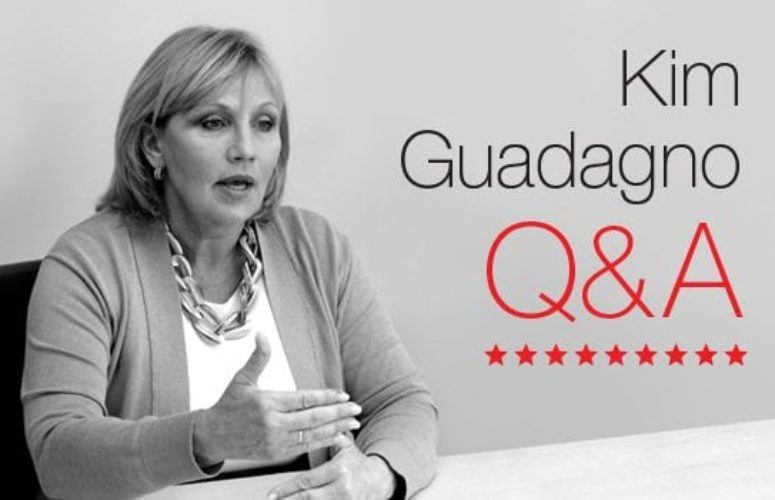
Kim Guadagno: Q&A
The Gubernatorial Battle
By Anthony Birritteri, Editor-in-Chief On Oct 2, 2017Q: The state’s unemployment rate is currently 4.2 percent, below the national average (at press-time). Additionally, 281,700 private-sector jobs have been created since February 2010. Yet, we hear reports that the state lags its neighbors in terms of job creation. What are your plans for spurring job and overall economic growth (the right type of job growth) in the state?
A: After talking to thousands of employers, over eight years, the No. 1 issue they face is keeping a qualified workforce in the state because it is so expensive to live here. So, we are going to make New Jersey more affordable again. If a tax can be raised, my opponent will raise it, whether it is the income tax, sales tax, business taxes or rolling back the estate tax. I would never do that. We need to make the state more affordable and we are going to start with our plan to cap the school property tax one pays to no more than 5 percent of household income. We estimate that will cost about $1 billion, but it will also save taxpayers upwards of $3,000 annually.
The next step is to make New Jersey more innovative. Real organic growth comes from small businesses. Last year, we saw a record number of new businesses created in New Jersey – about 103,000. However, we need to incentivize that. New Jersey should parallel or adopt a plan that looks a lot like what Israel did … the Start-up Nation. I would create the Office of Innovation. It would be a cabinet level position. I would charge the person who heads the office to look at the Israel plan as a roadmap to creating new jobs.
Q: The state has delivered beneficial business and personal wealth tax reforms these past few years. What are your plans to maintain these reforms and deliver additional ones?
A: I would fight any program that increases any tax. My opponent wants to reinstate the estate tax that everybody fought so hard to get rid of. He wants to increase taxes on the most taxed people in this country, which is beyond words. It’s irresponsible. It sends a bad message to the business community. His plans will put all of the economic progress we have made these last eight years to a full, hard stop.
He also wants to increase the minimum wage to $15 per hour. But first, we changed the State Constitution four years ago to account for automatically increasing the minimum wage. Second, if you talk to any food or grocery store owner in New Jersey, what they will tell you is that the $15 minimum wage will close the last grocery stores we opened here. Do you know where they are? Food deserts. That, to me, is unacceptable and intolerable. For no other reason, that’s why we should be opposed to the $15 minimum wage. It has already happened in New York City. We have some grocery store owners here who own stores in New York and who have had to pay an additional one dollar or two dollars on the $11 to $12 they were already paying. They have had to lay off 20 percent of their staff. And when the wage goes to $15, they are closing their stores in New York. That is not New Jersey, that is not how New Jersey treats its people in the inner cities or in any food desert.
Q: We hear both positive and negative stories about the state’s economic incentive programs. What are your thoughts about what is currently being offered? Should any changes be made?
A: You have to go back to where I was in 2009, we had the BEIP and BRRAG program, which were the only incentive tools we had to attract companies. We changed that in a bi-partisan way to the Grow NJ program, with the goal of building out areas that needed to be built out. For example, Camden. The program has accomplished its goals beyond anyone’s wildest dreams. But perhaps the incentives are too rich and need to be reevaluated. Maybe we need to look at the Grow NJ program and put some of that money into incentivizing creative companies in areas that we have a sweet spot, such as STEM and life sciences.
We need to evaluate where those incentives should be. For example, why don’t we have tax credits for Fort Monmouth, where we have 1,100 acres of pristine, empty property?
We should go back and do a full review and make sure we are getting our return on investment and make sure we are not leaving anybody behind.

“We need to make the state more affordable and we are going to start with our plan to cap the school property tax one pays to no more than 5 percent of household income.”
— Kim Guadagno
Q: What are your plans to rein in property tax increases and deliver property tax stabilization or decreases?
A: In my proposal, if the school property tax is more than 5 percent of your household income, you will only pay up to that 5 percent. A Gannet newspaper report said we aren’t bold enough in our 5 percent reduction. However, my opponent doesn’t have any plan at all. His plan is to make more money, which is not an option for many people in New Jersey if you live in the world most of us live in.
My Audit Trenton initiative is something similar to what was done more than 30 years ago by Governor Kean, but hasn’t been done since. It is an efficiency audit to make sure that the money you are sending to Trenton is being spent the way it is supposed to be spent – in the most efficient way. Gov. Kean saved about $100 million. I would audit all 25 state departments.
Q: Since higher skills in the workforce promote higher wages and attract more businesses, what are your plans to improve primary, secondary and higher education in the state?
A: We have more scientists and engineers per square mile than any place else in the world, and we need to keep it that way because that is one of our key tools in terms of attracting good businesses. We can maintain that in a couple of different ways. We have some of the best schools in the country, whether it’s primary, secondary or college.
We need to audit our school systems and make sure we are getting a decent return on our investment. I don’t mean just the urban areas, but everywhere.
However, you have to do it in the right way. You can’t take all that money from an audit and take it out of education. I would take the money and put it back into education … good, qualified teachers.
We need to reevaluate the curriculum with an eye towards 21st century jobs. We should institute computer coding, for example, in every classroom, starting with kindergarten. Why? Because that is the future as far as I understand it. It’s for the next generation of jobs, the 21st-century jobs that you and I can’t even think of.
The plan for school funding is going to have to be negotiated. I live in the world of reality, and the Democrats control the Legislature. We need to sit down and start at the basics.
Let’s do it in a way that brings all of the stakeholders to the table: the teachers, the parents, the counselors, the elected public officials, the experts – and let’s see if we can do it in a better way.
The other thing is [that], not every kid [needs to go] to college. I am a big fan of vocational schools … and today’s vocational school is not your parent’s vocational school. Let’s give some of these high school kids a skill that they then can translate into a job upon graduation. There are vocational schools in New Jersey that we need to expand. That would allow us to give students certifications that would allow them to find a livable wage when they left high school.
Let’s get them a job and then have them go to a community college at night, and let someone else pay for it … someone else other than a parent. Let the business, where they have a job, pay for it. It’s called stackable credentials. You get your certificate in high school, then you go to a two-year college, then to a four year college, then, if you want to, on to get a masters or PhD. … It’s all of that if you get that fundamental basic salary early on.
Q: What are your plans on stemming the exodus of millennials and seniors leaving the state?
A: Millennials are flying out of here because, for example, they can drive 10 to 20 minutes away [across the border] and save themselves tens of thousands of dollars per year. If a Republican is not elected in 2018, property taxes will not have a [2 percent] cap. Forget about property taxes decreasing as our plan provides. They will be going up an exorbitant rate, without any stopping.
Mayors will have absolutely no control over the arbitration cap. It will be gone. Your property taxes will be soaring and I haven’t been able to find a clear answer from my opponent on what he would do with the 2 percent arbitration cap. I imagine he cannot, given his position with his unions and the entities that have endorsed him, reinstate it.
Our plan provides certainty for senior citizens, it provides certainty for the families, most of whom are living paycheck to paycheck. Missing a paycheck is losing a house for them. We can’t afford to do that.
Q: How do you plan to approach solving the state’s pension crisis, while keeping the state’s budget in check?
A: I think that fighting, screaming and debating it in a public fashion has not accomplished the goal of fixing the pension problem. What we need to do is sit around a table, off the record, and negotiate. A starting point would be the Byrne/Healey report [“Report of the New Jersey Pension & Health Benefits Study Commission”], but labor and management need to sit down, negotiate and start with admitting what they can’t deny: that the pensions have to be fixed. This is the source of our 11 credit downgrades.
What we can’t do is what my opponent is doing, saying “yes” to everybody, because it is not responsible; it is naive.
The public employee coming on right now should get the private sector equivalent of a 401(k). But, can you force that on someone who has been in the system for 40 years and isn’t in the position to get a new job?
When I was talking with the New Jersey Education Association (NJEA), a woman was sitting next to me who worked as a special education teacher. She never made more than $10,000 a year, but she kept teaching because she knew she would get lifetime benefits and get a pension. That should be preserved.
Q: What is your plan to help state residents and businesses obtain and maintain affordable healthcare, especially in light of the healthcare debate in Washington, DC?
A: That’s the problem. In light of the healthcare debate in Washington, it is hard to give you a firm answer. My position has been, and always will be, that we cannot pull the rug out from the 530,000 people who engaged in the Affordable Care Act. The problem with the ACA is that it’s not a sustainable business plan. So, we need to find a way to provide coverage for those who we promised it to, and allow the coverage of preexisting conditions and make it affordable.
Q: What are your plans to make sure the right infrastructure (transportation, energy and water) investments are made in New Jersey at an affordable rate?
A: We need to make decisions on objective evidence-based outcomes that take into account quality of life, education and jobs. We need to have an overarching state plan that takes all of these issues into account. We need to take the politics out of the Transportation Trust Fund (TTF) and get rid of the panel of four. Whose idea was it to put four political appointees in charge of [road and bridge] infrastructure in New Jersey? I call it the panel of politics or the four horsemen of the apocalypse. If you implement evidence-based planning, getting engineers, housing people – the whole slew of planners who are experts in this area – and let them tell you which bridges are going to fall down first and then let’s fix them … that’s a concept. The same with the roads and the water infrastructure.
Then, we have to get our fair share from Washington when it comes to infrastructure funds. We need to do the Gateway project. We need to get the Trump administration and New York to provide their fair share. And, we need to pony up our fair share.
Q: New Jersey is a national leader when it comes to environmental protection. What are your plans for maintaining a clean environment in the state?
A: Quality of life is probably one of the major reasons why people stay here and want to raise their families here. I live at the Jersey shore. I have seen what happens during storms. I also know that renewables – solar, nuclear, green energy – have got to be a major part of our energy master plan. They are already, but we need to recommit to that. When Oyster Creek goes off line, you may see energy costs, businesswise and residential, go up exponentially if we don’t start back filling with another nuclear power plant, or look to offshore wind. We need to confront that as a problem.
Natural gas is the cheaper solution for now, but you have to factor in the cost of pipeline and infrastructure. Because gas is so inexpensive, it is going to be hard to put a renewable package together, but I think we have an obligation to future generations.
Q: What can we expect from you in your first 100 days in office?
A: We will see the first 100-day report from my Lt. Gov. on the audits. That is immediate. You will also see drafted and presented on the first day in office the school property tax cap on 5 percent of household income. Those two items will be keeping the major promise of making New Jersey more affordable for everyone.
Q: What is driving you to be the next governor of New Jersey?
A: I moved all around this country when growing up. I was born in Iowa then I lived in Michigan, Ohio, Indiana, Connecticut New York, Ohio and Michigan again, New York again, Indiana again.
I went to law school, got a job, met a guy who was born and raised in New Jersey. I knew that I wasn’t moving again, and that my family wasn’t going to be raised the way I was. So, for the last eight years, I worked hard to create jobs, understanding what happens when someone in a family loses a job. My dad was in sales and if he made his numbers we moved … and if he didn’t make his numbers, we moved. I know what happens to a baseball team, a football team, a swim team, a classroom, a community, when a family has to leave the state. So, when the governor asked me to create jobs, for me, it was personal. I enjoyed every minute of it and still do. The problem now isn’t unemployment, which is at 4.2 percent. The problem now is the cost of living. If we really want to accomplish what I set out to accomplish, then we have one more step to take: make New Jersey affordable again. Frankly, families can’t afford Phil Murphy. His proposal of a universal bank, of free pre-K, free k-12, free college education, a sanctuary state, increasing business taxes and insurance, sales, estate taxes … to me it would halt the last eight years of success. We would go backwards, and we need to move forward. The way to move forward is to make New Jersey affordable so that families can stay here or come back here. That is why I am running for governor.
Kim Guadagno: A Biography
Kim Guadagno was sworn in as New Jersey’s first Lt. Governor and 33rd Secretary of State on January 19, 2010. On November 5, 2013, she was elected to a second term. She was chosen and tasked by Governor Chris Christie to improve the state’s economic vitality and streamline government.
In striving to meeting these goals over the past eight years, Guadagno has chaired the state’s Red Tape Review Commission, which has been reforming various state regulatory processes. She is also head of the Partnership for Action (PFA), New Jersey’s four-pronged economic development strategy, which is comprised of: the Business Action Center; the New Jersey Economic Development Authority; Choose New Jersey; and the Office of the Secretary of Higher Education. Working together under Guadagno’s leadership, these agencies have been responsible for attracting, retaining and helping businesses throughout the state.
Guadagno also chairs the New Jersey Military Installation Growth and Development Task Force, which is charged with forging a blueprint for securing the long-term growth and viability of New Jersey’s military bases and US Coast Guard installations.
As Secretary of State, Guadagno is also the state’s chief election official, oversees promotion of the state’s $40-billion tourism industry and administers programs related to the arts, culture and history.
Guadagno began her public service career in 1988 as a federal prosecutor with the Organized Crime & Racketeering Strike Force in Brooklyn. She later rose to the position of an assistant United States Attorney for the District of New Jersey in Newark, where she built a reputation as an effective prosecutor for busting corrupt politicians. She was awarded the US Department of Justice’s highest honor for her prosecutions of two corrupt public officials.
From 1999 to 2001, she served as assistant attorney general for the State of New Jersey, responsible for statewide criminal investigations and oversight of 300 prosecutors and investigators.
In 2001, Guadagno left the public sector to practice law. She also became a teacher at Rutgers University School of Law-Newark.
In 2007, she was elected as the first woman sheriff in Monmouth County, where she managed a 650-member law enforcement agency.
Guadagno announced her candidacy for governor this past January. Running with her as Lt. Governor is Woodcliff Lake Mayor Carlos Rendo. At an event announcing Rendo’s selection in July, Guadagno said, “As mayor of Woodcliff Lake, Carlos has built a reputation as a strong, bipartisan leader and advocate for lower taxes … and transparent government. As lieutenant governor, he will put that experience to work for New Jersey families to help me lower property taxes and audit all aspects of Trenton.”
Guadagno was born in Waterloo, Iowa, to Patricia and Charles McFadden. She is a cum laude graduate of Ursinus College in Collegeville, Pennsylvania. She received her juris doctorate degree, cum laude, from the American University Washington College of Law in Washington, DC.
She met her husband, Mike, while working at the United States Organized Crime Strike Force in Brooklyn. They married and moved to Monmouth County in 1991. Mike served as the chief of the fraud division in the US Attorney’s Office in Newark. He was appointed by Governor Codey to the Superior Court in 2005. In 2012, Chief Justice Stuart Rabner appointed him to the Appellate Division of the Superior Court, where he remained until his retirement this year.
Kim’s oldest son, Kevin, is a second lieutenant in the US Air Force, having graduated from the Air Force Academy in 2015. Her second son, Michael, is a junior at Dartmouth College and her youngest son, Anderson, is a sophomore in high school. The family resides in Monmouth Beach.
Related Articles:






